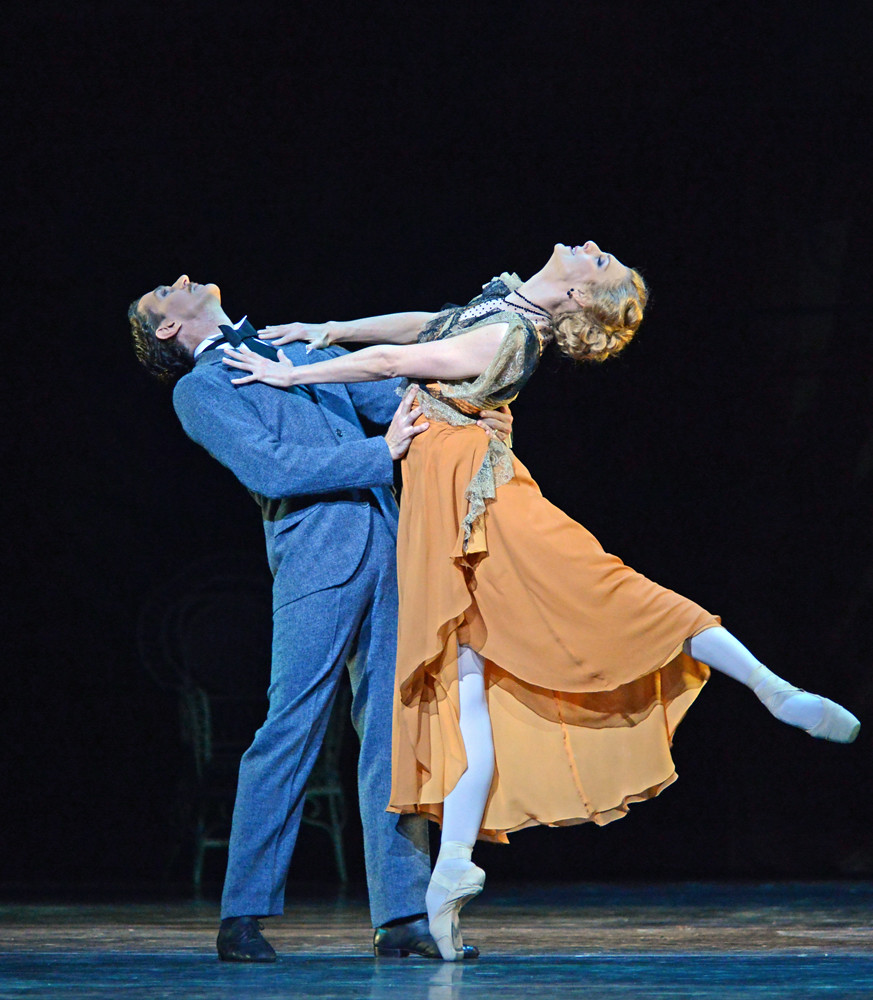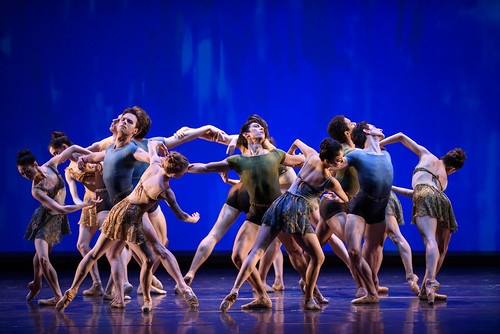It’s not often that I’m in London long enough to enjoy two
casts of the same show. So it was a delight to discover that in watching both
Obsidian Triples on the Royal Ballet’s last day of the season, I got to see
what felt like 6 entirely different pieces.
 |
| Image credit: Andrej Uspenski |
Obsidian Tear,
Wayne McGregor’s new piece, swung my opinions the most from
cast to cast. In the matinee, led by Lukas Bjørneboe Brændsrød, Nicol Edmonds
and Benjamin Ella, the story came across as one in which Brændsrød and Ella
were lovers, torn apart by society. Their movements were complementary; their
pas de deux conversational.
However in the evening’s performance, led by Matthew Ball,
Calvin Richardson and Edward Watson, Ball and Richardson presented a striking
similarity in physique, which suddenly implied that they were two halves of the
same person – with Richardson the tender hearted core of Ball, which he
eventually could not live without. Compared to the afternoon’s portrayal, their
movement geometries were much more alike, and their interactions more of
self-recognition than of love.
My second viewing also had the advantage of familiarity – I
was able to follow more of what was happening, and soon discovered the unique
characterizations of the different dancers. Some have mentioned Watson as a
type of devil character encouraging Ball to abandon Richardson. However there was
an interesting nuance to this, where it was Eric Underwood whom Watson first
incited, in a very intimate pas de deux where he literally rubbed his influence
off on the former. Underwood was then the one who marked Richardson, ultimately condemning
him.
The other key revelation of the evening’s version was Calvin
Richardson – an astonishing young spark who gave a remarkably honest and brave
performance. He embodied McGregor’s choreography perfectly, finding its
softness in a way I’ve not seen other Royal Ballet dancers able to do before,
and grounding the moves in an emotional truth. I am very much looking forward
to seeing him again.
 |
| Image credit: Dance Tabs |
The interpretations in The
Invitation were also wildly different between afternoon and evening. It
surprised me how much there is to the ballet – it gets unfortunately
shortchanged in summary when the description jumps to the rape scene.
Ironically, it was that scene which was the least poignant for me, because of
the far more engaging and intricate character developments that preceded it.
Thomas Whitehead’s Husband in the afternoon was your classic
perverted sociopath – not shedding an ounce of feeling from start to finish. He
only knew possessions, not emotions – and The Girl was to him like a porcelain
doll to be added to his chilling basement collection. He touched her tenderly
at first, careful not to damage the packaging – then finally decided To hell
with it, this one I actually want to enjoy, and ripped apart the packaging like
a rabid dog.
Olivia Cowley also gave a notable interpretation of the Wife
in the afternoon. It could be her likeness in age and demeanour to Yasmine
Naghdi, but I immediately saw The Girl buried inside her Wife. She had a
strange look of recognition upon seeing her Husband’s interaction with the
Girl, appearing to know from the start exactly how events would unfold. Her pas
de deux with the Boy felt like a reminiscence to a time when she herself was innocent, and she was merely trying to recapture a young love that was never afforded
to her. God, that hurt to watch.
Instead of reopening old wounds, the evening’s performance
cut entirely new ones. Its brand of anguish was rooted in how the poison of a
loveless marriage could come to destroy the innocence in its path. Gary Avis
and Zenaida Yanowsky portrayed a Husband and Wife whose pursuit of an outward
decorum had left all their arguments unresolved, festering into a deep mutual
hatred. Their disdain for one another was apparent from the moment they entered
– as Avis sauntered callously away mid-introduction, you could cut Yanowsky’s
irritation with a knife. The hatred was spread thickly onto their pas de deux,
as they pushed each other away as violently as propriety would allow. These two
incredibly powerful dancers brought so much history and subtext to their
partnership, even when standing still, that I truly felt the urge to tell them
to slow down and stop yelling at each other.
The Boy and Girl then entered into this mire, and the
resulting interplay was remarkably rich. Vadim Muntagirov soaked up Yanowsky’s
predation with such painful innocence; and Yanowsky’s pride was palpable as she
lured him in. Hayward flitted haplessly from Muntagirov’s clumsy affection to
Avis’ serene gravity; and Avis became increasingly amused by her flirtations,
repeatedly shaking his head subtly to both chide her and express his disbelief
about his growing power over her. It was a treatment so disturbingly gratifying
that despite the occasion, I began to grin widely, suddenly beside myself with
admiration for this magnificent company.
With Yanowsky, Avis and Hayward in particular adding so much
texture to their interpretations, there was simply too much to take in. At some
point, after trying desperately to watch the Wife watching the Husband watching
the Girl watching the Boy, I had to give up. What I can capture within my
limits as an audience member is far smaller than what these artists give on
stage; and what I can put into words, even less.
 |
| Image credit: Royal Opera House |
I lie – I actually only saw 5 ballets, because Within the Golden
Hour was so surprisingly soporific that I tuned out equally in the afternoon
and evening performances. Both casts were stellar of course in their execution,
but something just didn’t hit home with Christopher Wheeldon’s choreography. It could be
the God-awful costumes, as has been commented – but for me it was largely the
lack of an underlying movement theme. Nothing keeps the piece together – it is
simply a series of charming, but underwhelming, vignettes.
Anyhow. Dear Royal Ballet: I will miss you sorely this summer, even
more than I already miss you from living oceans away. But come hell or
highwater, I will always find my way to Covent Garden.
No comments:
Post a Comment